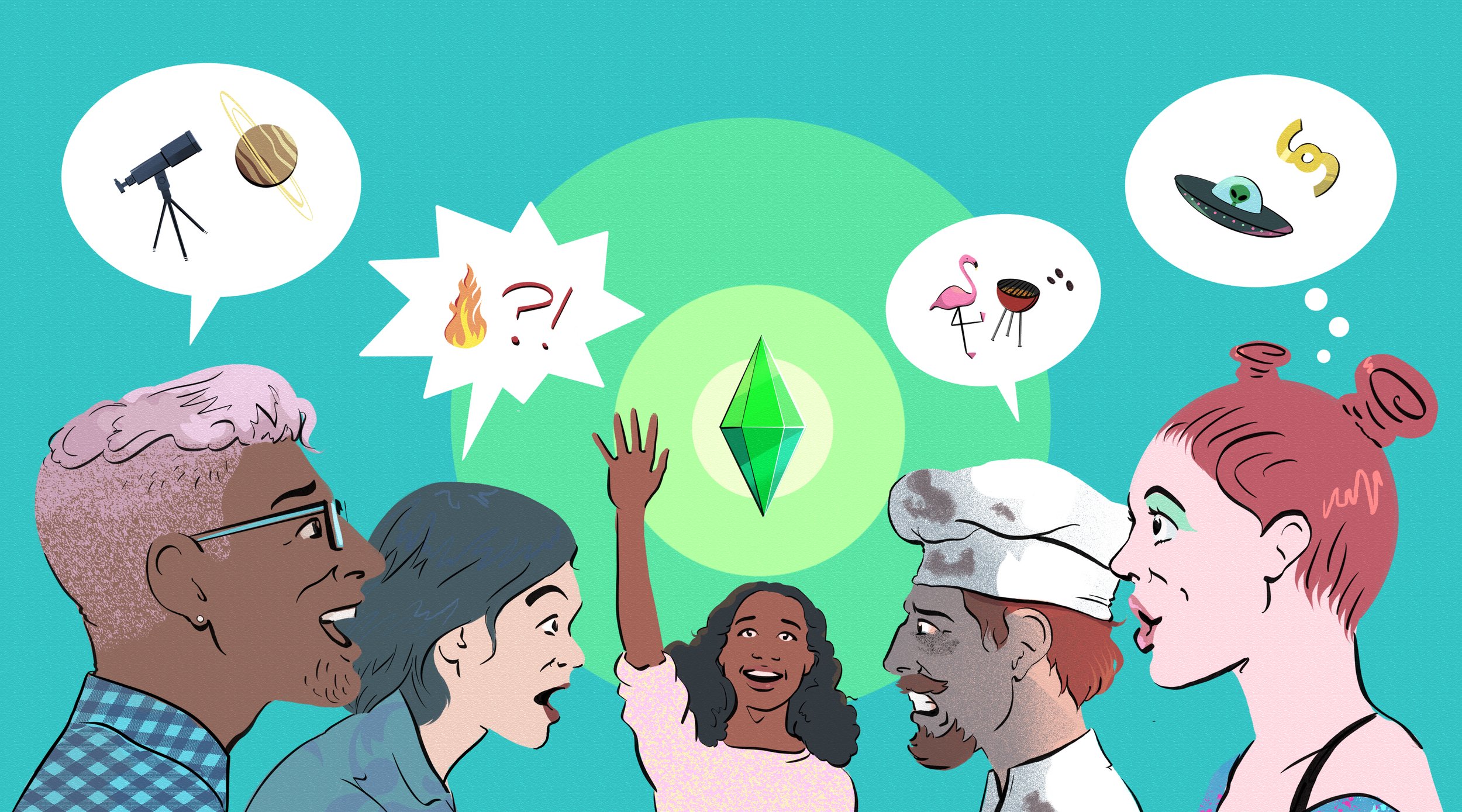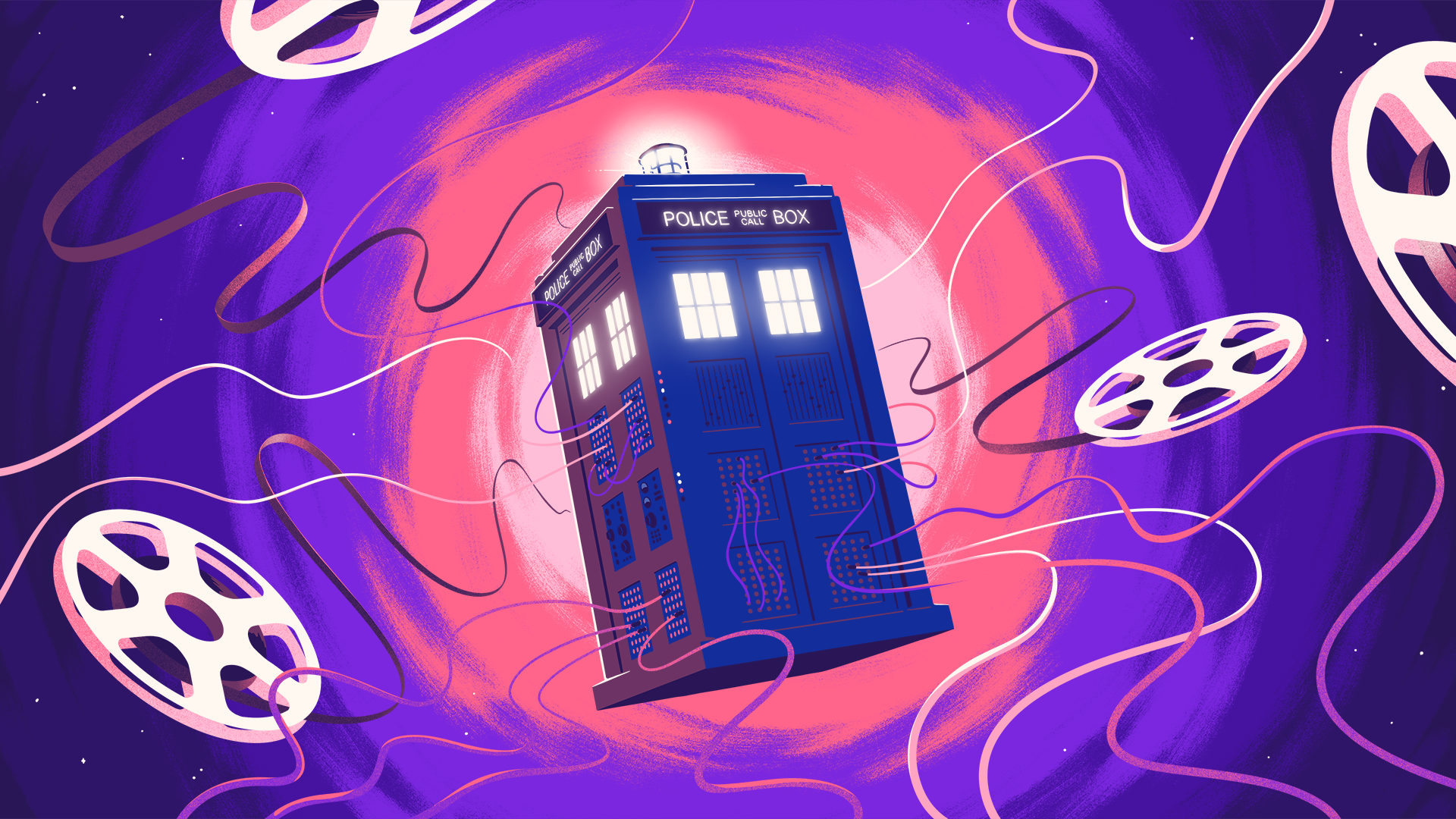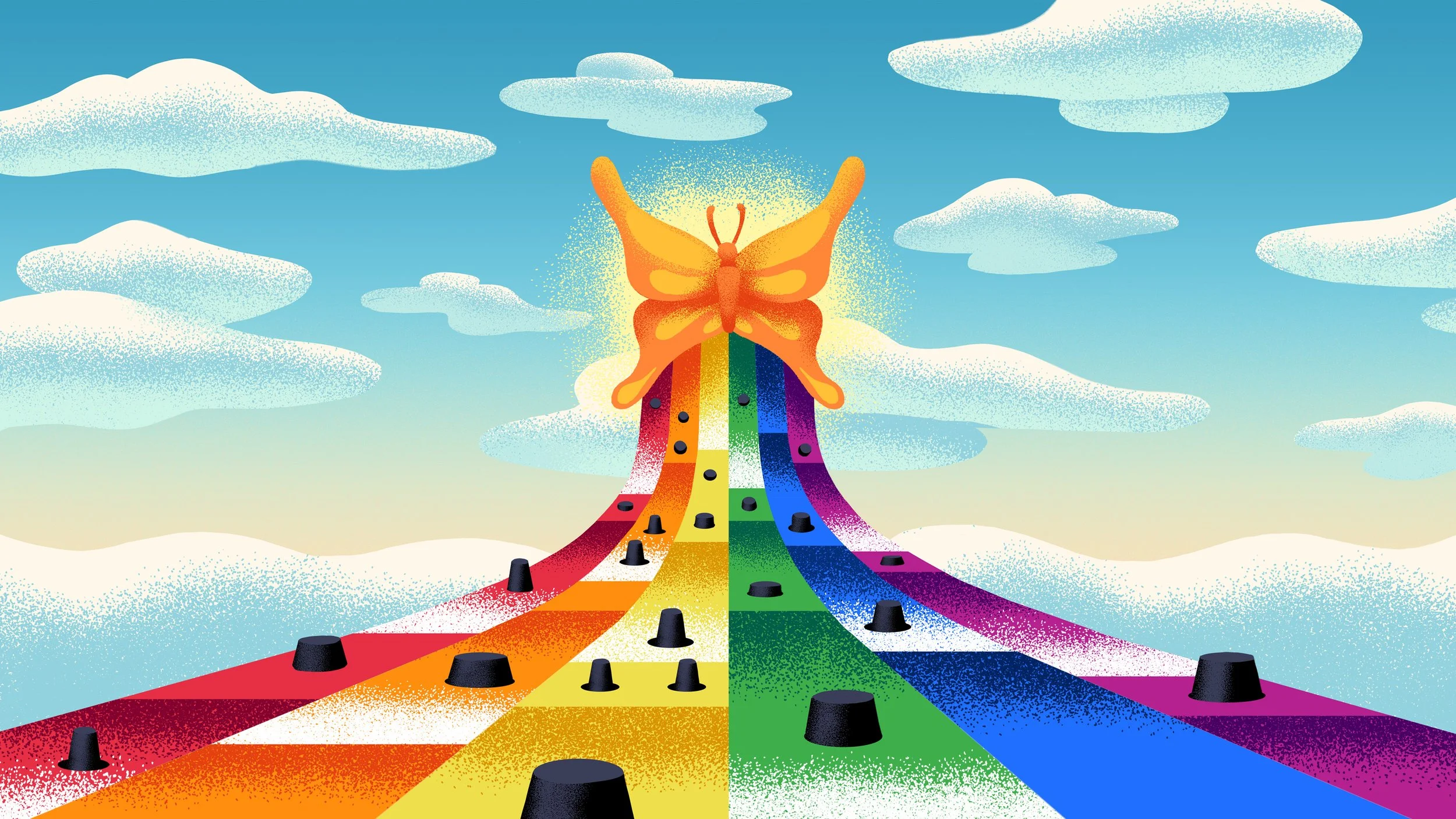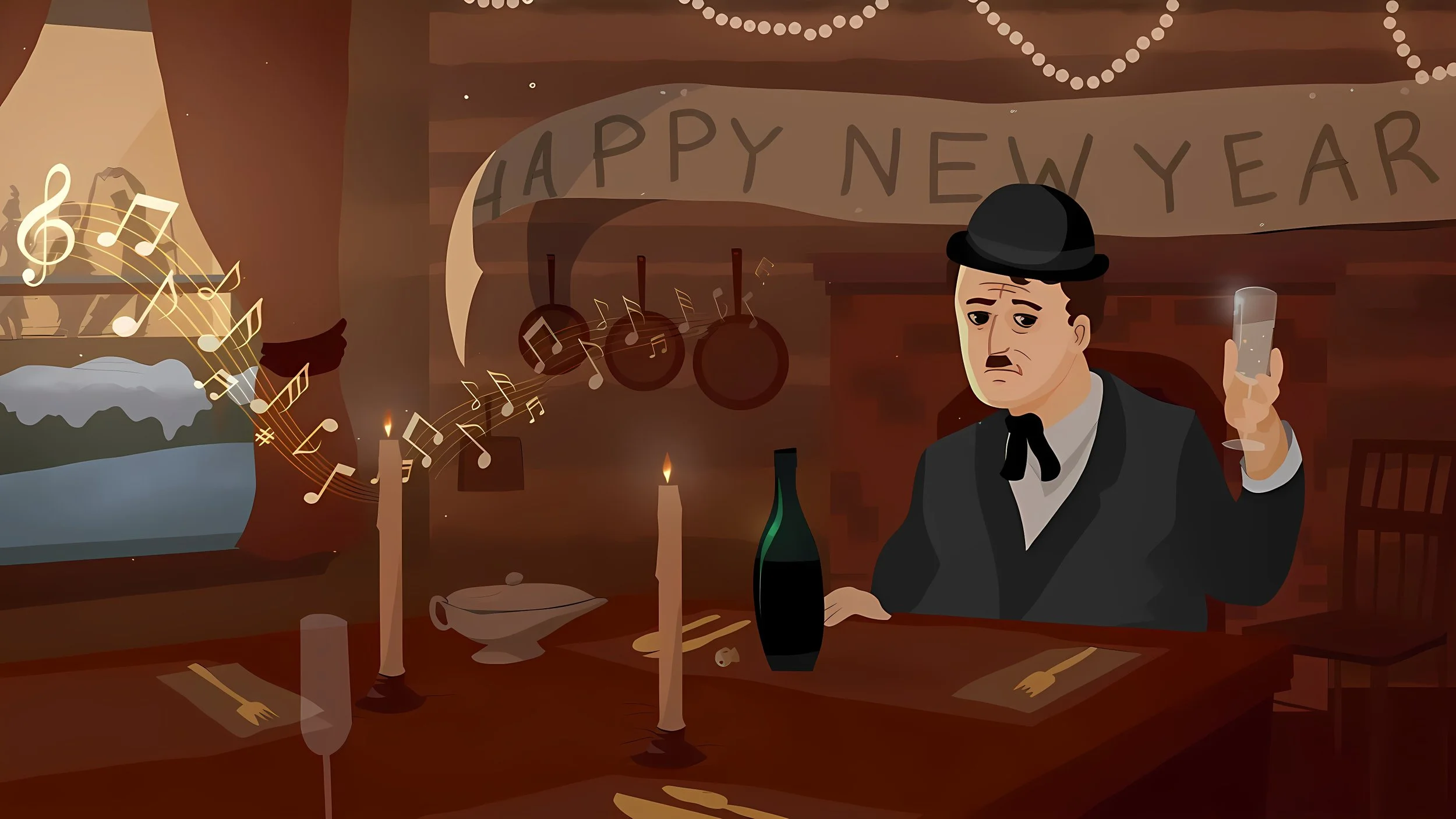Art by Jon McCormack.
This episode was written and produced by Hannah Seo, Andrew Anderson and Casey Emmerling.
When The Sims was first being developed, the creators faced a problem. They knew they wanted these characters to talk and interact, but they were worried that using a real language would quickly get repetitive and annoying. So, they decided to make one up. This is the story of Simlish: How it was created, why it works so well, and why artists ranging from The Black Eyed Peas to The Flaming Lips have re-recorded their songs in this gibberish language. Featuring Sims Designer & Voiceover Director Claire Curtin, Composer & Audio Director Jerry Martin, voice actress Krizia Bajos, and Youtuber Rachybop.
MUSIC FEATURED IN THIS EPISODE
Original Music by Wesley Slover
Buoyancy by Sound of Picture
Sidecar by Sound of Picture
Dreamliner by Sound of Picture
Superstandin by Sound of Picture
Arboles by Sound of Picture
Golden Era (No Oohs & Ahhs) by Virgil Arles
Twenty Thousand Hertz is produced by Defacto Sound.
Subscribe on YouTube to see our video series.
If you know what this week's mystery sound is, tell us at mystery.20k.org.
Support the show and get ad-free episodes at 20k.org/plus.
Follow Dallas on Instagram, TikTok, Facebook, and LinkedIn.
Join our community on Reddit.
Subscribe to Rachel's Youtube channels, Rachybop and Rachybop Gaming.
Check out SONOS at sonos.com.
View Transcript ▶︎
You’re listening to Twenty Thousand Hertz.
[music in]
Reality entertainment is everywhere these days. Thanks to Instagram, Tik Tok, Youtube and Twitter, we can follow peoples’ lives more closely than ever before. And over on the television side, shows like The Bachelorette, The Masked Singer and The Real Housewives are still some of the highest rated programs out there.
[sfx clip: The Masked Singer] Legendary superstar comedian Larry the Cable Guy / No way! /...Are you not entertained?
These shows are based on real people reacting to real situations. Or at least, situations that pretend to be real.
[sfx clip: Real Housewives] The only thing that keeps my mind sane is the fact that my pastor is on the way. I'm trying to keep my Jesus, because you're one step away from getting your face punched in.
We’re so used to it by now, that it feels totally normal. But this kind of entertainment only took off in the last couple of decades. The first really big reality show was Survivor, which started in the year 2000. Over 120 million people tuned in to watch the season finale.
[music into sfx clip: Survivor] The winner of the first Survivor competition is… Rich. Congratulations, Rich.
That same year, a computer game came along that perfectly tapped into this hunger for reality. It was called The Sims.
[sfx clip: Sims commercial] Loveable, unpredictable, programmable, it’s The Sims! ...When you create the characters, and design the surroundings, anything’s a possibility! The Sims: It’s a new game everyday.
The Sims was unlike any game that came before it. It wasn’t a platformer like Mario Brothers [sfx: Mario jump sound], or a racing game [sfx: Forza] or a puzzle game [sfx: Tetris], or a first person shooter [sfx: Goldeneye]. Instead, it was called a life simulation game. In it, you make a customized character who can decorate their house [sfx: hammering], watch TV [sfx: TV chatter], do the dishes [sfx: dishes clanging], learn an instrument [sfx: guitar strum], and find a job [sfx: coins + cash register]. They can also get excited [sfx], depressed, [sfx] they can laugh, [sfx] get into arguments, [sfx] and even fall in love [sfx].
[music in]
The Sims was created by a game studio called Maxis Software. The company’s founder, Will Wright, had always been fascinated by architecture. His first big success was one of my favorite games of all time, SimCity. In it, you build your own city from scratch.
[sfx: SimCity drilling / construction sounds]
That’s what it sounds like when you build power lines.
[sfx: more building sounds]
In the early 90s, Will’s house burned down. Fortunately though, he and his family were all okay. But this experience got him thinking about what really mattered in his life. In an interview with the website Berkleyside, Will said quote: “When something like this happens, you get a big picture. Where do I want to live? What sort of things do I need to buy?”
From there, Will started reading studies about people’s shopping habits, and how they spend their free time. He started thinking about a game that would be like Sim City, but more personal. Instead of building an entire city, your character would build a home, and go about their everyday lives.
[music out]
When he took this idea back to the Maxis board of directors, they weren’t very impressed. But shortly after, Maxis was acquired by an up-and-coming juggernaut of a game company.
[EA ident] EA Games: Challenge Everything.
EA Games saw the potential in Will’s idea, and gave him the money he needed to make it. So Will and the Maxis team got to work.
[music in]
Claire: We just sat in a room and designed the game for a couple of years.
That’s Claire Curtin.
Claire: On The Sims, I was a Designer, and the Voiceover Director.
When Claire first started working on the game, it wasn’t even called The Sims.
Claire: It was sort of secretly called Dollhouse.
That name... didn’t last too long.
Claire: Dollhouse was seen as being too girl focused, and of course this game was to appeal to not boys or girls, but everybody.
So they settled on the name The Sims, which is short for “simulated people.” It’s also what the people in SimCity were called.
Claire: The Sims as an overall, overarching name was just the right thing for how this game developed and evolved.
[music out]
By the late 90s, The Sims was almost ready for release. But the designers still hadn’t decided what the characters would sound like. They were worried that using a real language would get super repetitive.
Claire: If you look at The Sims the player is constructing a universe where they might test out things over and over and over again. So, what we didn’t want was repetition. And there is nothing more boring than hearing the same phrase over and over and over again from the Sims that are on screen. So we needed to remove the structure of language, any language, that your ear would just get so used to that it would become boring and annoying.
Instead of using an existing language, they decided to just… make one up. They called it Simlish.
[music in]
At first they tried blending sounds from different languages together.
Claire: We tried mixing up some languages that we knew a little bit of.
Claire: One was with Ukrainian...
[sfx clip: Ukrainian]
Claire: I think we had some Estonian…
[sfx clip: Estonian]
Claire: We were really just trying to find the right vocal sound that was again, not too repetitive, but carried a lot of emotion.
But none of these ideas were really working. Then, Claire remembered an exercise that she had seen actors use.
Claire: There's an exercise that's done in improv theater of making up, I think, a poem of two actors on stage. One will make up a poem in a completely gibberish language, and the other one will translate it into English, and it's usually hilariously funny.
[music out]
Claire realized that this could be a great way to approach Simlish. It would allow these characters to be expressive and animated, without being locked into the rules of any specific language. So she brought two improv actors into the recording studio.
[music in]
Claire: Stephan Kiernan and Gerri Lawlor were the male and female voice in the game, and they were the most playful and creative people, and boy, were we lucky to have them.
While they recorded, the actors would watch animations of the characters moving.
Claire: And these were just wire frame animations, not clothed, no expressions or anything on the Sim. And both actors were in the booth at the same time. And as they were watching the animation, they would voice, with their own ideas of what it should sound like.
[sfx clip: Male Sim talking]
Claire: And then we would bounce back.
[sfx clip: Female Sim talking]
Claire: And we would sometimes do, depending on the complexity of the animation, 10, 15, sometimes 20 takes a person, going back and forth and back and forth.
[sfx clip: Male & Female Sims talking]
Claire: The great part about that was that they could play off each other, and they were great friends and could really read each other, because they had done a lot of improv on stage together.
[sfx clip: Male & Female Sims interacting pleasantly]
Claire: So the flow of this was really just terrific, and very energetic, and really exhausting too.
[sfx clip: Male & Female Sims arguing]
[music out]
Now, there are a few official Simlish words that have developed over the years. For example, Sul Sul and Dag Dag are both common ways to say Hello and Goodbye.. Yes is yibs, and no is neeb. But 99.9 percent of the dialogue in the game was made up on the spot by the voice actors. And that gives these Simlish conversations lots of variety. It also allows you to imagine what these characters are talking about.
Claire: The point is that you put your own thoughts and your own responses onto that gibberish that you're hearing.
[sfx clip: Simlish clip]
When The Sims finally launched in the year 2000, it was a huge hit. It sold 11 million copies, which made it one of the most popular games that year. Pretty soon, EA started releasing expansion packs for the game, followed by several sequels. As the series grew and grew, more voice actors got to learn the secrets of Simlish.
[music in]
Krizia: [Simlish]
That’s Krizia Bajos, a voice actor who’s been working on The Sims for almost a decade.
[sfx clip: Krizia simlish]
At this point, speaking in Simlish is almost second nature.
Krizia: I joke that I'm trilingual. You know? Spanish, English, and Simlish.
Krizia: I just love the way it rolls off the tongue. I can make it, like, [Simlish]. Or [Simlish] So it really gives me a lot of range.
Krizia fell in love with Simlish in her first audition.
Krizia: I remember, specifically, the audition was pretty great because it was a Sim in front of a mirror and she's checking herself out and... we always start with non-verbals with Sims. It's like, “Ooh, ah, [Simlish].” You know, you're just making things up. And then maybe you're angry or you're on the phone and like, “Ugh! [Simlish]”
Since Simlish has basically no structure, you might think it would be easy to pick up. But it’s actually pretty hard to talk continuously without using any real words. Some of the voice actors they bring in just can’t pull it off.
Krizia: I worked with one of the gentlemen that unfortunately got cut, and he was having a hard time with it. I think a lot of it, and I think that this is true to most artistic endeavors, is the ability to release control.
Krizia: For stuff like this, you really have to just be able to flow. I think just being relaxed about it.
Krizia: Once you get the idea of the world that you're supposed to be living in, I think the best thing to do is kind of free fall into it and let your own instincts guide you.
[music out]
But for some people, finding that flow is almost impossible.
Jerry: It’s kinda funny with the Simlish because some people sort of got it and could do it, and other people could just never do it.
That’s Jerry Martin. He was the Audio Director and Lead Composer for the Sims and SimCity.
[music in]
Like Kritzia, Jerry has seen a lot of people who really struggle with this gibberish language.
Jerry: In fact there was a point on, it was further on in the series, where Drew Carey,
[sfx clip: Drew Carey] Hey, welcome to Who’s Line Is It Anyway, the show where everything’s made up and the points don’t matter.
Jerry: He apparently really liked The Sims, and wanted to get involved, and so he wanted to do some Simlish. And so I sent one of my sound designers down to LA to record him. Apparently, he couldn't really do the Simlish. He couldn't improvise, so he actually wrote it out phonetically. I don't know exactly how he wrote it out, but he wrote it out, and so he did it that way.
Those recordings were used in The Sims House Party expansion pack. If your character throws a good enough party, a Sim version of Drew Carey shows up in a limo.
[sfx clip: Drew Carey Sim, speaking Simlish]
But Drew Carey wasn’t the only celebrity who made it into The Sims. After the game became a hit, EA got artists like The Black Eyed Peas, The Flaming Lips and Katy Perry to record Simlish versions of their music. All the while, this gibberish language started spreading to the masses.
That’s coming up after the break.
[music out]
MIDROLL
[music in]
The Sims is a real life simulation game that came out just as reality TV was taking off. In the game, the characters all speak a quirky, gibberish language called Simlish.
[sfx clip: General Simlish]
Even if these sounds don’t have any specific meaning, they still do a great job of conveying emotion. Just by listening, it’s pretty easy to tell when you’re Sim is excited about something...
[sfx clip: Excited Sim]
...when they’re angry.
[sfx clip: Angry Sim]
...or when they’re being flirtatious.
[sfx clip: Flirty Sim]
[music out]
But of course, Simlish was just one part of the game’s overall audio experience. They also needed music that would be just as distinct and memorable as the dialogue.
Jerry: I basically wrote some simple sketches of some melodies and some chords and I had some little riffs and stuff in mind.
That’s Jerry Martin, who composed most of the music for the original game. When Jerry first started, Sims creator Will Wright gave him some general direction.
Jerry: His input was he wanted to hear kind of a New Age jazz feel for the Build Mode in The Sims, which turned out pretty good.
[music clip]
Jerry: Other than that, I was pretty much on my own as far as figuring out what might go good with it. And I sort of came up with the idea of this sort of '50s shopping music kind of a throwback to the old nice family TV shows.
[music clip: Mall Rat]
In the game, your Sim can also listen to the radio, and tune in to different stations. That means they needed songs in a bunch of different genres. For instance, Will Wright specifically wanted a bossa nova song for the Latin station.
[music clip: BoSIM Nova]
For the country station, they brought in a live bluegrass band.
[music clip: SIM Hoe Down]
Now, some of these songs were instrumental, but others needed vocals… Simlish vocals. So Jerry had to coach these studio musicians to sing in Simlish. According to him, the key is to mumble.
Jerry: One of my pet peeves with Simlish was when some of the actors would enunciate too much, it would sound kind of fake to me, so I would always try to get them to make it more mumbly, so that it sounded more realistic.
For example, here’s a country tune called Yippio Ki Oh.
[music clip: Yippio Ki Oh]
And here’s a hair metal song, called SIM Hagar.
[music clip: SIM Hagar]
This one has a pretty strong 90s alternative rock vibe.
[music clip: Oh Sims]
To create the rap station, they auditioned a bunch of different rappers.
[music clip: Ee I Ooo Oh]
Jerry remembers having to remind them not to fall back into their English lyrics.
Jerry: A lot of them would kind of revert back to their rapping and sneak their words back in.
[music clip: music switches to Spring Break clip, then out]
As the series got bigger and bigger, so did the starpower behind it. Pretty soon, famous artists were recording Simlish versions of their songs to use in the game.
The Black Eyed Peas re-recorded several tracks for an expansion pack called The Urbz: Sims in the City. Here’s the original version of their song Shut Up.
[music clip: Black Eyed Peas Shut Up]
And here it is in Simlish.
[music clip: Shut Up Simlish]
For the Pet expansion pack, The Flaming Lips redid their song Free Radicals. Here’s the original…
[music clip: Flaming Lips Free Radicals]
And here’s the Simlish version...
[music clip: Free Radicals Simlish]
In 2010, Soulja Boy released his single Speakers Going Hammer.
[music clip: Speakers Going Hammer]
The Simlish version came out just a week later, in the Late Night expansion pack.
[music clip: Speakers Going Hammer Simlish]
For a mini-expansion called Katy Perry Sweet Treats, Katy Perry re-recorded her song Last Friday Night.
[music clip: Katy Perry Last Friday Night]
...And the Simlish version is called Lass Froobee Noo.
[music clip: Last Friday Night Simlish]
And it doesn’t stop there. Depeche Mode redid their song Suffer Well…
[music clip: Suffer Well Simlish]
The band Fun did a version of their hit single We Are Young.
[music clip: We Are Young Simlish]
Nelly Furtado did her song Manos Al Aire.
[music clip: Manos al Aire Simlish]
And speaking of Nellies, a recent Sims expansion pack included this cover track.
[music clip: Hot in Herre Simlish]
So, if you ever wanted a kid-friendly version of Hot in Herre, ditch the Kids Bop and turn on the Sims soundtrack.
[music clip: Hot in Herre out]
Of course, EA wouldn’t be licensing all of these songs and making all of these sequels if the games didn’t have a huge fan base.
Rachybop: The people in the community around the Sims are amazing, really passionate bunch of people, from all over the world.
[music in]
Rachael: I'm Rachael, I'm known online as Rachybop. I have multiple YouTube channels, and I love playing The Sims and making videos about The Sims.
Rachybop has been a Sims fan since the very beginning.
Rachael: In the year 2000 my friend had bought it and he said, "Oh, I've got this game. I think you'll really like it.” And goodness, I remember setting up a little home.
After a few hours, she decided to take a break. So she put her sister in charge of watching over her Sims. But when she came back, she found out that her Sims’ house was on fire. [sfx: Sims fire]
Rachael: My poor little sister, she's a lot younger than me, she was like, "Oh, I'm so sorry! He started a fire and now they're all dying!" [laughs]. So after that I was totally hooked. And then I got really into it when the Sims 3 came out, and started buying every pack and all the DLC and that kind of stuff, and it's been like that ever since. Just obsessed [laughs].
[music out]
These days, Rachybop posts all kinds of Sims content on her Youtube channels, including reviews, demos, and Simlish tutorials.
[sfx clip: Rachybop Simlish guide] Sul Sul...hello. Oh feebee lay… I’m hungry. Noo boo... Baby.
But her favorite videos to make are when she sings Simlish versions of popular songs.
Rachael: When I make my Simlish parody videos, I am transported to this magical place in my head, and it just flows out of me.
Rachael: Definitely the best and easiest one to sing was Hello, by Adele, because that's just so funny as a concept in itself.
[music clip: Rachael singing Hello]
Rachael: But yeah, that was the nicest because it's nice and slow and you can belt it out. So it sounds like really passionate, like a Sim.
[music clip continue: Hello chorus, then fade under]
Rachael: I think the comedy in it, the fact that you've got this person singing this completely made up language and absolutely probably sounding very awful, just singing her heart out, is just so funny to me. It just adds to the comedy of the game, which is what the Simlish and the Sims is supposed to do, and just make people smile.
[music in]
It’s been more than twenty years since the first Sims game came out, and the series is still going strong. Even playing it for just a few minutes, it’s easy to see why it became such a hit. It was one of the first games that allowed you to create a world that’s exactly the way you want it to be. And it’s not just a world… but a life.
Rachybop: It's like truly universal. Worldwide, age-wide. It can just be played by anybody. It's not violent. It's just so pure, and you can take it in any direction that you want to.
Simlish is just one part of this game, but it’s a crucial part. It’s a gibberish language where the only meaning comes from the emotions behind the sounds. And that means that anyone can understand it, and anyone can speak it.
Krizia: The Sims would not be The Sims without Simlish.
Krizia: It’s a language from no one, made for everyone. Everyone has access to it. Nobody is excluded from it.
Krizia: And I think it's really amazing that they had that vision when they first created this game, to have a language where it would be accessible to all.
For superfans like Rachybop, Simlish has become more than just part of the game. It’s part of their culture.
Rachybop: It’s a very special thing for Simmers. It's like deep rooted in us as we play.
Rachybop: If you know it, then you must play this game that I love. So it's immediate friendship.
Rachybop: I mean loads of the people that we meet when we go to international events, or online, especially, you don't really know who you are talking to. They just say “Sul sul!” and you know, they're a friend [laughs].
[music transition into credits track: Virgin Arles - Golden Era]
Twenty Thousand Hertz is hosted by me, Dallas Taylor, and produced out of the sound design studios of Defacto Sound. To get some tasty sonic snacks, follow Defacto Sound on Instagram.
This episode was written and produced by Hannah Seo, Andrew Anderson, and Casey Emmerling, with help from Sam Rinebold. It was sound designed and mixed by Soren Begin and Joel Boyter, with original music by Wesley Slover.
Thanks to our guests, Claire Curtin, Krizia Bajos, Jerry Martin, and Rachael Purdy, also known as Rachybop. You can find links to Rachel’s Youtube channels in the show description.
Thanks for listening.
Rachybop: Dag dag.
[music out]





